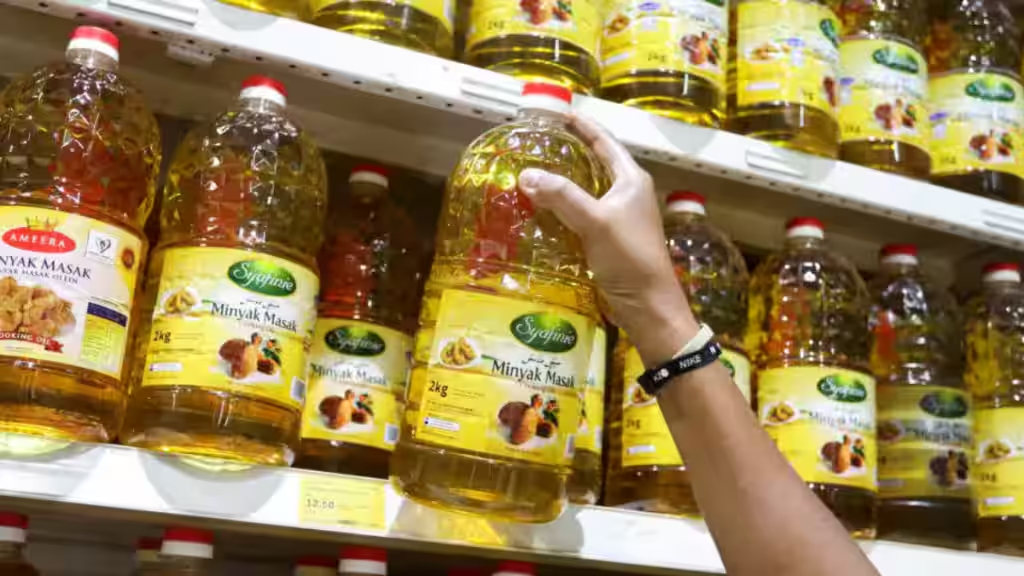Edible palm oil to witness 10% revenue growth this fiscal, says CRISIL

India’s palm oil industry is expected to see a 10% revenue increase this fiscal year due to consistent demand and favorable pricing. Palm oil, which dominates 38-40% of edible oil consumption in India, is crucial for food processing and the HoReCa sector. The rise in demand is driven by urbanization and increased consumption of processed foods. Global CPO output stagnation and the extension of zero import duties are also contributing to higher revenues and operating margins.
Edible palm oil to witness 10% revenue growth this fiscal, says CRISIL Palm oil dominates edible oil consumption in India with 38-40 per cent share in volume as it is used largely in the food processing and hotels, restaurants and catering (HoReCa) segments Written by FE Online July 31, 2024 13:17 IST Follow Us
The surge in demand is due to rising urbanisation, increased consumption of processed and outside food (Reuters) The revenue of domestic edible palm oil refiners is predicted to increase by around 10 per cent this fiscal year due to consistent demand and greater realisations, as per a report by CRISIL. It further highlights that the operating profitability is expected to increase by 40-50 basis points (bps) to around 3.5 per cent due to favourable prices and continued duty-free imports.
Over the medium term, credit risk profiles of palm oil refiners’ will remain stable due to strong balance sheets and the absence of significant debt-funded capital expenditure (capex).
As per the report, palm oil dominates edible oil consumption in India with 38-40 per cent share in volume as it is used largely in the food processing and hotels, restaurants and catering (HoReCa) segments. The HoReCa segment accounts for 45-50 per cent of the overall consumption while the household and industrial segments consume the rest.
Also Read
Payment disruption! UPI, IMPS temporarily unavailable due to ‘ransomware attack’ on C-Edge Technologies As Nirmala Sitharaman announces reforms in tourism, let’s rediscover India’s cultural gems – From Bihar’s Bodh Gaya and Nalanda to Odisha’s beaches and temples Telcos to report ARPU improvement in range of Rs 225-230 by next fiscal, growth to be driven by tariff hike, data consumption surge Kanchanjunga Accident: Commissioner of Railway Safety highlights lapses at multiple levels, calls it ‘accident-in-waiting’
Rahul Guha, Director, CRISIL Ratings, said, “In the latest budget, the government’s endeavour to strengthen the domestic production of oil seeds to support domestic availability was amply clear, but the outcome could be little long drawn. In the meantime global CPO output is expected to remain stagnant at 78-79 million tonne, leading to a price rise of 7-8 per cent this fiscal. Along with steady volume increase, this will lead to Indian edible palm oil industry revenues rising approximately 10 per cent this fiscal.”
Why surge in demand?
The surge in demand is due to rising urbanisation, increased consumption of processed and outside food. In addition to this, India has ample refining capacities but does not produce much crude palm oil (CPO) to feed the refineries and is dependent on the world’s largest producers, that is Malaysia and Indonesia for over 90 per cent of its CPO requirement.
Furthermore, the industry is set to witness volume growth of 3-4 per cent this fiscal to approximately 93 lakh tonne. The operating margins are expected to expand by 50 basis points to around 3.5 per cent due to improved economies of scale, strong commodity hedging policies, and continued duty-free imports of CPO.
Interestingly, the global palm acreage has stagnated owing to sustainability and environmental concerns, ultimately leading to price rise. Due to this, Indian refiners are unlikely to build capacity in the medium term, and cash accrual will be more than sufficient to fund incremental working capital requirements and maintenance investment. As a result, credit profiles will remain stable this fiscal year, with total outside liabilities to tangible networth (TOLTNW) and interest coverage ratios estimated at 1.25 and 4 times, respectively.
“In fiscal 2023, the government of India had extended the zero import-duty structure for CPO for two straight years until March 2025. The duty structure was earlier set to expire in March 2024. The import duty for CPO was as high as 40 per cent pre-pandemic. The extension will help regulate domestic supplies and keep prices in check, whilst supporting profitability this fiscal,” Rishi Hari, Associate Director, CRISIL Ratings, added.
















